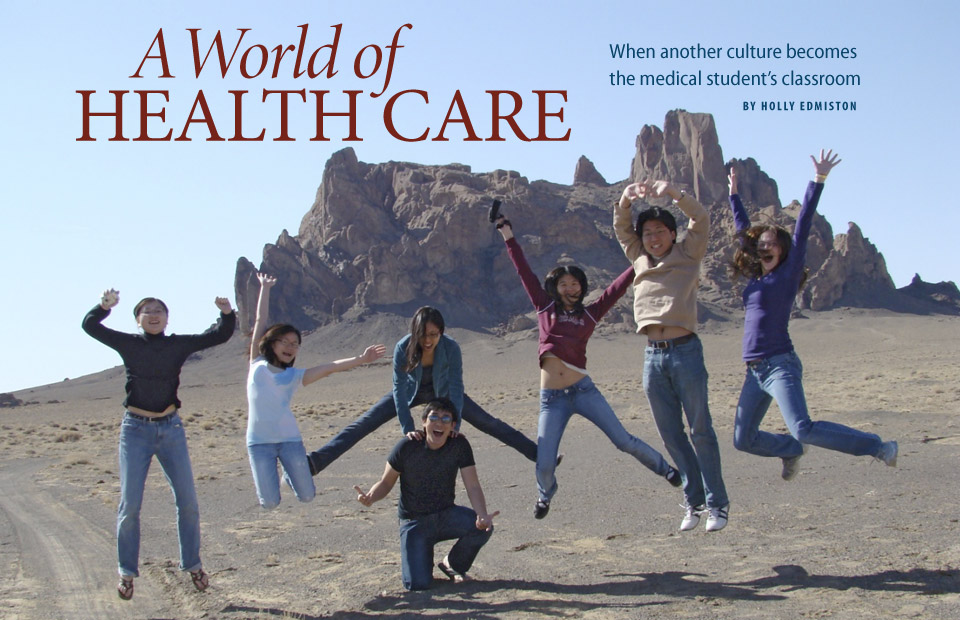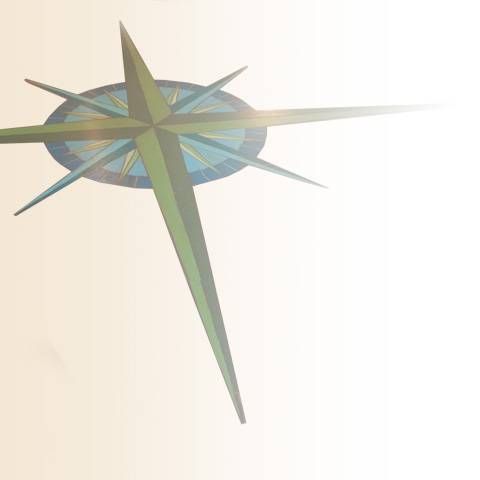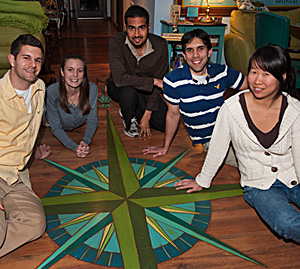

Whether in a St. Louis clinic, on a southwestern Navajo reservation, or halfway across the planet, Washington University medical students are always learning. At the same time, they’re also leaving a legacy of care for the communities they visit and serve.
Medical students at Washington University are well-known for the breadth of activities they perform that go above and beyond the required curriculum. In the St. Louis community, they staff a neighborhood health clinic, teach drug and sex education at city schools, and are involved in various facets of public health education.
Many students, however, wish to broaden their perspectives as future physicians by participating in research and health care in other parts of the United States or around the world. That’s where the Forum for International Health and Tropical Medicine (FIHTM), a student-led group devoted to promoting the understanding of global health, comes in.
About 12 years ago, a medical school faculty committee formed to develop a system for awarding grants for international student electives.
Concurrently, medical students had started FIHTM. The two groups combined their efforts and today, FIHTM, with financial support from the dean’s office and the Washington University Medical Center Alumni Association, sponsors nearly 30 students each year to help realize their dreams of experiencing global health care firsthand.
“Medical training should include an international component,” says Gary J. Weil, MD, professor of molecular microbiology and of medicine and faculty mentor for FIHTM. “Patients travel; immigrants from all over the world who have different types of diseases and different cultures come here. International experiences change our students — the way they practice medicine as well as their attitudes toward medicine.”
According to Weil, FIHTM is one of the largest international electives programs offered at any medical school in the United States. “We are proud of this exciting program,” he says.
Three types of travel scholarships fall under the FIHTM banner. The Student Opportunities Abroad Program (SOAP), allows first-year students to participate in research projects or medical issues in the summer between the first and second years of medical school. Spring Break community service trips allow students to learn about the medical systems of foreign cultures, whether they be within our own borders (Navajo Nation, first-years) or in a developing country (second-years). Although third-year students are generally too busy with clinical duties to travel, fourth-years can apply for Jonathan Mann Fellowships, which support clinical rotations at foreign institutions.
Kathryn M. Diemer, MD, assistant dean for career counseling, oversees the logistics behind these working trips. While students are responsible for planning all aspects of their trips — each project’s focus, who their mentors will be, and whether it is safe to travel to a country based on U.S. State Department warnings, it is Diemer’s job to advise students and arrange for a faculty committee review of FIHTM fellowship applications.
“Our students are very good about putting all these things together,” says Diemer, “but we want to be sure that each situation is optimal. We don’t want students put into the position of being expected to do more than they are trained to do, so we need to know who will be supervising them and exactly what their responsibilities will be.”
Cynthia A. Wichelman, MD, assistant professor of emergency medicine, mentors FIHTM students, reviewing their weekly updates from abroad and helping to resolve issues that arise. She also is course master for International Health, a first-year selective.
“The course is an excellent opportunity for students to hear from inspirational faculty who have been instrumental in improving the lives of people in developing countries,” says Wichelman. “Each year the number of students entering the School of Medicine with an interest in doing work abroad increases. We help the students prepare for the work they will do as part of FIHTM.”
Wichelman and nine second-year students recently returned from a Spring Break trip to Guatemala, where Joaquin Barnoya, MD, research assistant professor of surgery, led discussions with local health care professionals. The students also assisted in rural clinics, built stoves for the poor, and visited schools and an AIDS orphanage.
Not all FIHTM students travel to poor or developing countries, however. One recent graduate traveled to Germany and eventually published a historical study of the treatment of depression in communist East Germany during the 1950s. Other students have studied specialized hand surgery in Scotland, learned about the United Kingdom’s National Health Service, or worked as interns at the World Health Organization in Switzerland. The key, says Weil, is that FIHTM helps students to access experiences not available in St. Louis.
CONTINUED BELOW

FIHTM second-year student leaders have traveled to the “four corners of the earth” (l-r): Michael C. Verre, Kristen S. Grant, Sathish Subramanian, Christopher W.A. Lawrence and Yi Wang at The Map Room, a coffeehouse located in St. Louis’ Benton Park neighborhood.
While abroad, students are required to keep a daily log detailing their experience. Upon return, they must write a trip summary for the use of future students and present a poster at the annual FIHTM International Health Symposium. The symposium brings a visiting professor to St. Louis each year to talk about global health, while less formal events, such as lunchtime lectures and dinner meetings with faculty, take place year-round.
Weil says FIHTM has served as a model for other medical schools developing international programs, though many don’t have the administrative and alumni support enjoyed at Washington University. Still, he notes, the economic downturn in recent years has decreased available alumni funding, curtailing the number of projects that can be sponsored and requiring students to cover some of their own travel and living expenses.
Heidi L. Sandige, MD 05, instructor in pediatrics, was among the first group of FIHTM students to receive SOAP fellowships. For her SOAP, Sandige traveled to Egypt, where she worked at the U.S. Naval Medical Research Unit on a clinical research study of typhoid fever in children. In later years of medical school, she worked in Malawi with Mark J. Manary, MD, professor of pediatrics, on Project Peanut Butter, in Madagascar with the American Red Cross on a measles eradication campaign, and, as a Jonathan Mann fellow, in Belize on a wilderness emergency medicine course.
“I made the decision to attend medical school based on a desire to work in global health, but even strong motivation founders without opportunity,” says Sandige, a pediatrician at St. Louis Children’s Hospital who still works in Africa regularly. “I give Washington University and FIHTM tremendous credit for allowing me to realize that dream.”
Sandige believes that early opportunities to experience international work are key. By the time students reach their final year of medical school, many decisions about how they will live their personal and professional lives have already been made, she says. At that point, international work may seem like a sacrifice as they face large student loans, mortgages and career commitments.
“There are many ways to arrange a career so that international medicine becomes a natural part of it,” says Sandige, “but it must be a deliberate choice. Students need the opportunity to realize this possibility.”











